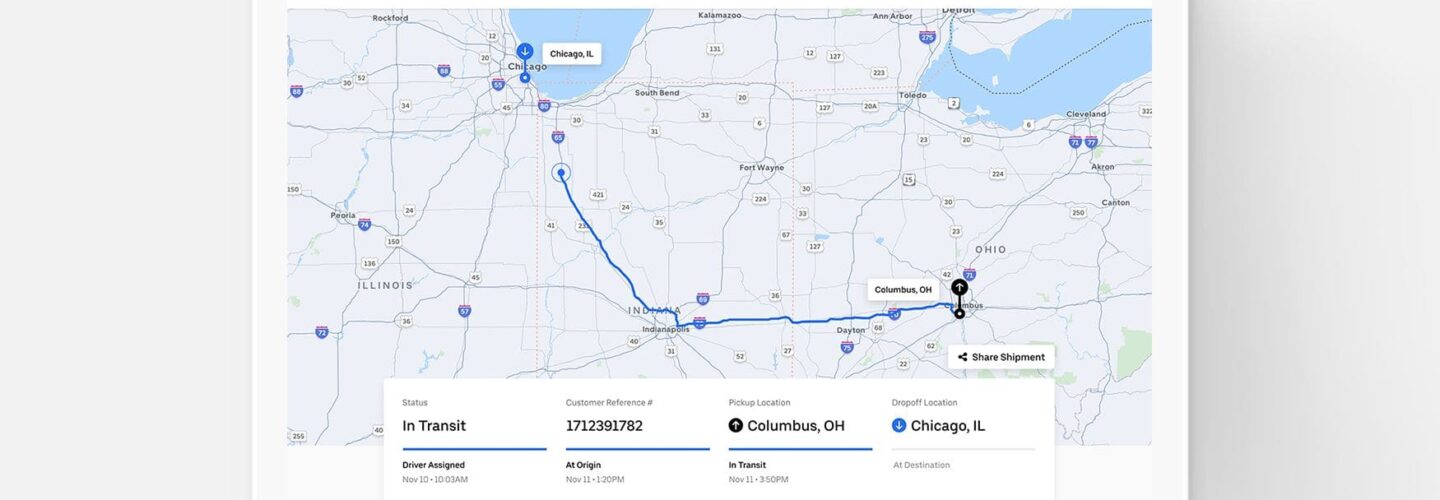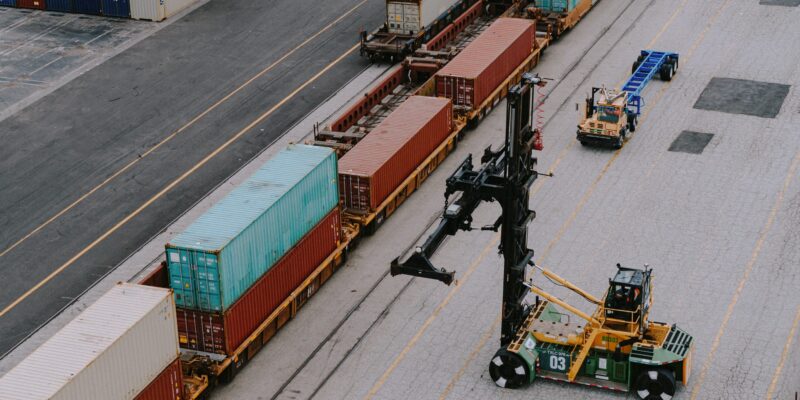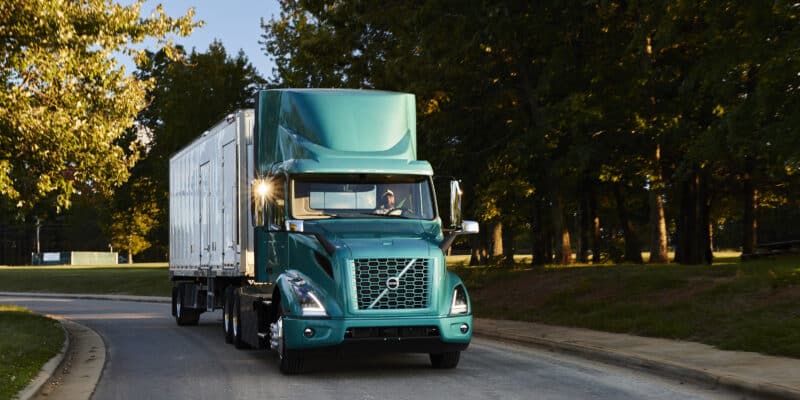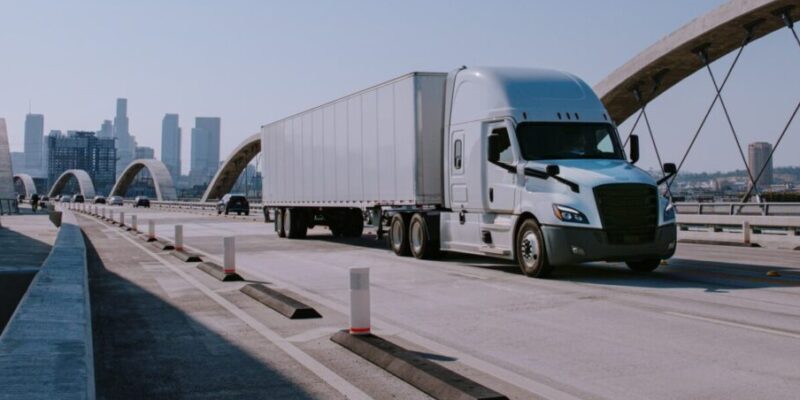Freight tracking – How it’s done & why shippers need It

In an increasingly volatile and fast-paced logistics landscape, freight tracking is an indispensable tool for shippers. As goods traverse complex supply chains, the ability to track their movements has become essential for businesses to respond proactively to disruptions, ensure timely delivery, and improve customer satisfaction.
Real-time monitoring of shipments offers enhanced visibility and transparency, empowering shippers to make informed decisions and optimize their supply chain operations. As customer expectations continue to rise, freight tracking becomes a key differentiator, enabling shippers to deliver superior service by providing consignees with access to up-to-date information on their shipments.
At Uber Freight, we recognize that reliable freight tracking is the core of modern logistics. That’s why we offer a suite of digital solutions to empower businesses to stay ahead, including advanced tracking technologies and comprehensive tracking systems. Our freight shipping services on Shipper Platform is a one-stop-shop solution enabling businesses to seamlessly book, track, and manage all of their loads. For growing enterprises ready to upgrade their logistics strategies, our end-to-end transportation management system (TMS) offers more hands-on, comprehensive support.
Explore our offerings for shippers and how they can transform your business operations.
What is freight tracking?
Freight tracking, also known as shipment tracking or cargo tracking, is the process of monitoring and tracing the movement of goods or freight during transportation from the point of origin to the final destination. It involves using various technologies and systems to provide real-time or near-real-time updates on the status, location, and progress of the cargo while it is in transit.
Freight tracking is a crucial aspect of logistics and supply chain management, enabling shippers, consignees, and other stakeholders to stay informed about the whereabouts of their shipments and ensuring that they reach their intended destinations safely and on time. Freight tracking provides several benefits, including improved visibility and transparency into the supply chain, ability to share shipment locations, timely information for decision-making, proactive exception management, and enhanced customer satisfaction.
Shippers can track their freight shipments in a variety of ways, often using digital solutions like Uber Freight’s Shipper Platform or TMS. Digital solutions make managing different types of loads like intermodal, multimodal, or less-than-truckload (LTL) shipments easier using real-time visibility.
Learn more about our offerings and discover what works best for your business.
Intermodal shipments
Intermodal transportation refers to the movement of freight using multiple modes of transportation. In an intermodal system, cargo is loaded into standardized containers that can easily be transferred between different modes of transportation, such as trucks, trains, ships, and airplanes. The containers remain sealed throughout the journey, reducing the need for labor-intensive loading and unloading at each transfer point.
Intermodal transportation offers several advantages, including increased efficiency, reduced cargo handling, lower risk of damage or loss, and more environmentally friendly operations due to the use of larger, more fuel-efficient modes like trains and ships for long-haul segments.
Intermodal shipments are also relatively easy to track, because the cargo is packed in the same container throughout the entire shipment journey.
Multimodal shipments
Multimodal transportation also involves the use of multiple modes of transportation, but in this case, the cargo may require handling or transloading at intermediate points when changing from one mode to another. Unlike intermodal transportation, where the cargo remains in the same container throughout, multimodal transportation may involve unloading and reloading the cargo from one mode to another during its journey.
While multimodal transportation provides flexibility in choosing the most appropriate modes of transportation for different segments of the journey, it often requires additional logistics and handling, leading to potential delays and higher costs compared to intermodal transportation.
The more complex logistics of multimodal transportation make freight tracking more difficult. But with the help of easy-to-use tools like Uber Freight’s tracking systems, shippers can ensure they know the whereabouts of their shipments at every stage.
Less-than-truckload shipments
Less than truckload freight (LTL) is a type of freight shipping where multiple shippers share the same truck to move their loads. Transportation costs for each shipper are typically calculated based on the amount of truck space used, the class of items being shipped, and locations for pickup and delivery. This is different from FTL (Full Truckload) shipping, where one shipper rents the entire truck for their cargo.
The LTL method is more cost-effective than shipping full truckloads. It gives shippers greater speed and flexibility, while helping them save on resources that would otherwise be spent on unneeded truck space and fees. LTL shipping also offers other value-added services like liftgate service at pickup and delivery, residential service, inside pickup and delivery, and notification options.
Like multimodal transportation, tracking LTL shipments can be complex. Each truck is segmented to carry loads from multiple shippers, which can lead to fragmented information for shippers. But with proper tracking techniques, shippers can know where their LTL loads are and when they’re set to be delivered with ease.
Real-time visibility
Real-time visibility in freight tracking refers to the ability to monitor and access up-to-date information about the location, status, and progress of shipments as they move. It allows shippers, consignees, carriers, and other stakeholders to have immediate access to accurate and timely data regarding the movement of goods throughout the transportation process.
Uber Freight solutions, including our Shipper Platform and TMS, leverage real-time visibility to provide important load status updates. Shippers can access all of the information they need in one place, thanks to our real-time supply chain visibility platform partner, Descartes MacroPoint.
What can comprehensive freight tracking do for shipper businesses?
Comprehensive freight tracking offers numerous benefits to shipper businesses, enhancing their operations and customer service capabilities. For small-to-midsize businesses (SMBs) or for larger enterprises looking for more managed support, Uber Freight makes these benefits easily accessible through our Shipper Platform and our TMS solution. Both offerings include real-time tracking, but our TMS can do even more—including leverage analytics to determine the optimal mode and lane, improve service levels by assessing KPIs, and automate workflows to enable more accurate documentation.
Increased efficiency
By leveraging comprehensive freight tracking, shippers can enhance efficiency throughout their operations, including in their supply chain and resource management. Optimized routes, reduced transportation delays, and improved communication contribute to overall supply chain efficiency. Shippers can also plan labor, warehouse space, and equipment usage more effectively using shipment information, including precise location and estimated arrival time.
Improved risk management
Real-time tracking helps shippers identify potential risks in advance, such as delayed shipments or route deviations. By being aware of these risks, shippers can take proactive measures to mitigate them and minimize the impact of supply chain disruptions on shipment timelines. Immediate awareness of exceptions helps shippers manage issues immediately, instead of waiting until more severe problems arise.
A competitive advantage
Adopting comprehensive freight tracking technology can give shippers a competitive edge. The ability to offer real-time tracking and superior customer service distinguishes them from competitors who may not provide such capabilities. Customers value transparency and responsiveness, and comprehensive tracking can enhance a shipper’s reputation for reliability and professionalism.
How exactly is freight tracked?
Here are the key steps in a shipment’s journey and the documents and numbers that assist in freight tracking:
Tender
A tender is the first document required when any business needs to freight a shipment. Shippers will create a tender to request quotes or bids from carriers directly or via a brokerage or logistics platform. An accurate tender will help streamline the freight tracking process throughout the shipment’s journey.
Bill of lading (BOL)
A bill of lading, often abbreviated as a BOL, is the written contract between the shipper and carrier. Once a tender is accepted by both the shipper and carrier, a BOL confirms the details of the shipment. Each BOL document has a unique number associated with it to assist freight tracking of the shipment.
PRO numbers
A PRO number, sometimes used as an acronym for progressive routing order number, is part of the tracking identification number that a carrier assigns to each shipment. Every shipment receives their own PRO number to make freight tracking easier. This number is included in the BOL for shippers to easily identify and track their shipments.
Proof of delivery
A proof of delivery document (POD) is the same document as a BOL, but includes the consignee’s signature as proof of receipt. In freight tracking, PODs serve as evidence that the shipment reached its intended destination.
Digital systems with tracking capabilities like the Uber Freight Shipper Platform and TMS provide shippers and consignees real-time information about their shipment’s location status. By combining different means of freight tracking, the system gives shippers the most accurate information possible. Some of these sources are:
-
-
-
- Carrier tracking systems – Carriers use their own tracking systems to manage shipment status. Instead of navigating to separate carrier portals for each shipment, shippers use a consolidated system from a freight brokerage like Uber Freight.
- Electronic Data Interchange (EDI) – EDI exchanges information electronically between the shipper and the carrier. For streamlined freight tracking, Uber Freight leverages carrier EDI to maintain up-to-date statuses in our Shipper Platform and TMS.
- Automated notifications – Email and SMS keep shippers informed about their loads’ progress. Notifications from the Uber Freight Shipper Platform and TMS offer proactive updates to help shippers streamline operations.
- Real-time visibility integrations – Integration with a real-time visibility platform provides seamless updates to shippers within their TMS solution or Shipper Platform. Uber Freight uses Descartes MacroPoint to integrate these real-time shipment updates into our own digital solutions.
-
-
Using a TMS for freight tracking
TMS stands for Transportation Management System. It is a software solution used in freight tracking and logistics management to streamline and optimize transportation operations. TMS platforms offer a range of functionalities, including freight tracking, hands-on support, automated reporting, and more.
Using a digital TMS for freight tracking offers shippers three core benefits:
Enhanced Visibility and Real-Time Tracking
A TMS provides real-time visibility into the movement of shipments. Shippers can access their online portal to monitor their cargo’s progress, access up-to-date status updates, and track the exact location of their shipments throughout the transportation process. This level of visibility allows for proactive decision-making, timely responses to disruptions, and improved communication with customers, resulting in a more efficient supply chain.
Improved Efficiency and Cost Savings
A TMS solution’s enhanced visibility allows shippers to optimize transportation operations by automating tasks such as load planning, carrier selection, and route optimization. By consolidating shipments and identifying the most cost-effective carriers and routes, a TMS helps reduce transportation costs and improve resource utilization.
Better Reporting and Data-Driven Decision-Making
TMS platforms generate a wealth of data and performance metrics, enabling shippers to conduct comprehensive data analysis. By leveraging data-driven insights, businesses can identify patterns, evaluate carrier performance, analyze transit times, and make informed decisions to optimize their logistics operations. The ability to access actionable data empowers shippers to continuously improve their supply chain processes and deliver better customer service.
Tracking logistics with Uber Freight
To ensure customer satisfaction and remain competitive amid an unpredictable market, shippers need to be better prepared to manage transportation risk and navigate unexpected disruptions. Real-time freight tracking empowers shippers with complete operational transparency across their supply chains, giving them the insights they need to respond proactively.
The Uber Freight Shipper Platform is suited for SMBs looking to gain additional insight into their shipments’ status throughout the freight journey. The platform can be used to book, manage, and track loads seamlessly. Businesses can sign up now to get instant freight quotes from trusted carriers with 24/7 support from Uber Freight’s support team. It’s a one-stop shop solution for shippers ready to uplevel their freight tracking capabilities. Sign up today: https://www.uberfreight.com/carrier-network/freight-shipping-services/
For larger companies or enterprises that need more managed support, Uber Freight’s digital TMS solution is the right fit. Taking the basics of the Shipper Platform to the next level, our TMS takes a technology-led approach with custom solutions and personalized support from our team. Integrate the easy-to-use platform in under two weeks, and see immediate results in business operations and efficiency. Contact an Uber Freight representative for a TMS demo today: https://www.uberfreight.com/logistics-applications/tms/



